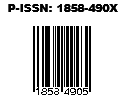Pengaruh Quick Response Code Indonesian Standard (QRIS) terhadap Minat Beli Masyarakat (Studi Kasus di Distrik Manokwari Barat)
Abstract
The success of a payment system is largely determined by the advantages offered by its features, such as the Quick Response Indonesian Standard (QRIS). This research aims to explore the inherent features of QRIS—specifically convenience, speed, and security—and how they influence people's purchasing interest in the Manokwari District of Manokwari Regency. We utilized primary data collected from informant responses through questionnaires distributed via Google Forms. The data were analyzed using a multiple linear regression approach with Ordinary Least Squares. The findings indicate that both convenience and speed significantly and positively impact people's purchasing interest in West Manokwari District. In contrast, the security factor does not have a significant effect on shopping interest. Consequently, the policy implications suggest enhancing citizens' knowledge of digital financial literacy and strengthening digital financial infrastructure to improve the convenience of using QRIS for shopping transactions.
The success of a payment system is largely determined by the advantages offered by its features, such as the Quick Response Indonesian Standard (QRIS). This research aims to explore the inherent features of QRIS—specifically convenience, speed, and security—and how they influence people's purchasing interest in the Manokwari District of Manokwari Regency. We utilized primary data collected from informant responses through questionnaires distributed via Google Forms. The data were analyzed using a multiple linear regression approach with Ordinary Least Squares. The findings indicate that both convenience and speed significantly and positively impact people's purchasing interest in West Manokwari District. In contrast, the security factor does not have a significant effect on shopping interest. Consequently, the policy implications suggest enhancing citizens' knowledge of digital financial literacy and strengthening digital financial infrastructure to improve the convenience of using QRIS for shopping transactions.
References
Bank Indonesia. (2020a). Kanal dan Layanan. Https://Www.Bi.Go.Id/QRIS/Default.Aspx.
Bank Indonesia. (2020b). Sistem Pembayaran dan Pengelolaan Uang Rupiah. https://www.bi.go.id/id/fungsi-utama/sistem-pembayaran/default.aspx
Bryan, N. M., Keni, K., Negara, E. S., & Dharmawan, P. (2023). Pengaruh Brand Competence, Brand Trust, Brand Experience, dan E-Wom terhadap Brand Loyalty Dompet Digital. Jurnal Muara Ilmu Ekonomi Dan Bisnis, 7(1), 17–29.
Halizah, S. N., Infante, A., & Darmawan, D. (2022). Keterbentukan Kepercayaan Pelanggan Shopee Melalui Kualitas Hubungan, Reputasi dan Keamanan Marketplace. Ekonomi, Keuangan, Investasi Dan Syariah (EKUITAS), 4(1), 256–261.
Ilmiyah, K., & Krishernawan, I. (2020). Pengaruh Ulasan Produk, Kemudahan, Kepercayaan, Dan Harga Terhadap Keputusan Pembelian Pada Marketplace Shopee Di Mojokerto. Maker: Jurnal Manajemen, 6(1), 31–42.
Junaidi, J., Roji, A., & Munawar, K. (2015). Konsep Otomatisasi Sistem Pembayaran SPP Online Untuk Mengurangi Tingkat Keterlambatan. Proceedings Konferensi Nasional Sistem Dan Informatika (KNS&I).
Juliandi A, Irfan, Manurung S. 2014. Metodologi Penelitian Bisnis: Konsep dan Aplikasi. Medan: UMSU Press.
Kusumaningtyas, F. I., & Budiantara, M. (2023). Pengaruh Penggunaan Qris Sebagai Metode Pembayaran Terhadap Pengembangan UMKM Di Kabupaten Sleman Sejak Pandemi Covid-19. Journal of Economics and Business UBS, 12(3), 1603–1616.
Lintangsari, N. N., Hidayati, N., Purnamasari, Y., Carolina, H., & Ramadhan, W. F. (2018). Analisis pengaruh instrumen pembayaran non-tunai terhadap stabilitas sistem keuangan di Indonesia. Jurnal Dinamika Ekonomi Pembangunan, 1(1), 47–62.
Liu, P. L. (2020). COVID-19 Information Seeking on Digital Media and Preventive Behaviors: The Mediation Role of Worry. Cyberpsychology, Behavior, and Social Networking, 23(10), 677–682.
Magdalena, N. (2005). Model Stimulus-Organism-Response: Penentu Perilaku Pembelian Konsumen Secara Situasional. Jurnal Manajemen Maranatha, 4(2), 53–67.
Maulia. (2022). Dampak Penggunaan QRIS Dalam Meningkatkan Pendapatan UMKM Kota Medan.
Mukarramah. (2023). Pengaruh Dompet Digital (E-Wallet) Terhadap Minat Beli Konsumen (Studi Kasus Pada Masyarakat Milenial di Jakarta).
Munte. (2017). Analisis Pengaruh Sistem Pembayaran non Tunai Terhadap Pertumbuhan Ekonomi Indonesia.
Munte, Y. S., Ginting, P., & Sembiring, B. K. F. (2022). The Influence of Trust and Sales Promotion on Repurchase Intention Through Consumer Satisfaction in Doing Online Shopping in Medan City. International Journal of Research and Review, 9(8), 318–337.
Nainggolan, E. G. M., Silalahi, B. T. F., & Sinaga, E. M. (2022). Analisis Kepuasan Gen Z Dalam Menggunakan Qris Di Kota Pematangsiantar. MANAJEMEN: Jurnal Ekonomi, 4(1), 24–32.
Pohan, S., Ivana, R., & Kurniasih, F. (2023). Sistem E-Samsat Sumatera Utara Bermartabat: Sebuah Inovasi Untuk Meningkatkan Pelayanan Publik. Jurnal Ilmu Komunikasi Dan Sosial Politik, 1(2), 116–126.
Pramono, B., Yanuarti, T., Purusitawati, P. D., & DK, Y. T. E. (2006). Dampak Pembayaran Non Tunai Terhadap Perekonomian Perekonomian Dan Kebijakan Moneter an Kebijakan Moneter.
Putritama, A. (2019). The Mobile Payment Fintech Continuance Usage Intention in Indonesia. Jurnal Economia, 15(2), 243–258.
Septyadi, M. A. K., Salamah, M., & Nujiyatillah, S. (2022). Literature Review Keputusan Pembelian dan Minat Beli Konsumen Pada Smartphone: Harga dan Promosi. Jurnal Manajemen Pendidikan Dan Ilmu Sosial, 3(1), 301–313.
Seputri, W., Soemitra, A., & Rahmani, N. A. B. (2023). Pengaruh Technolgy Acceptance Model terhadap Minat Mahasiswa Menggunakan Quick Response Code Indonesian Standard (QRIS) sebagai Cashless Society. MES Management Journal, 2(1), 116–126.
Silaen, E., & Prabawani, B. (2019). Pengaruh Persepsi Kemudahan Menggunakan E-Wallet dan Persepsi Manfaat serta Promosi Terhadap Minat Beli Ulang Saldo E-Wallet Ovo. Jurnal Ilmu Administrasi Bisnis, 8(4), 155–163.
Sujarweni, V. W., & Utami, L. R. (2016). The Deciding Factor is the Timeliness of Corporate Internet Reporting on Manufacturing Companies Registered in Bei. Jurnal Riset Akuntansi Mercu Buana, 2(1), 119–137.
Yunita, N. R., Sumarsono, H., & Farida, U. (2019). Pengaruh Persepsi Risiko, Kepercayaan, Dan Keamanan Terhadap Keputusan Pembelian Online Di Buka Lapak (Studi Kasus Pada Komunitas Buka Lapak Ponorogo). ISOQUANT: Jurnal Ekonomi, Manajemen Dan Akuntansi, 3(1), 90–105.
A.G, S., Sukmawati, S., & Pramono. (2012). Pertimbangan dalam Membeli Produk Barang Maupun Jasa. Intidayu Press.
 Abstract view : 0 times
Abstract view : 0 times PDF Views : 0 times
PDF Views : 0 times












